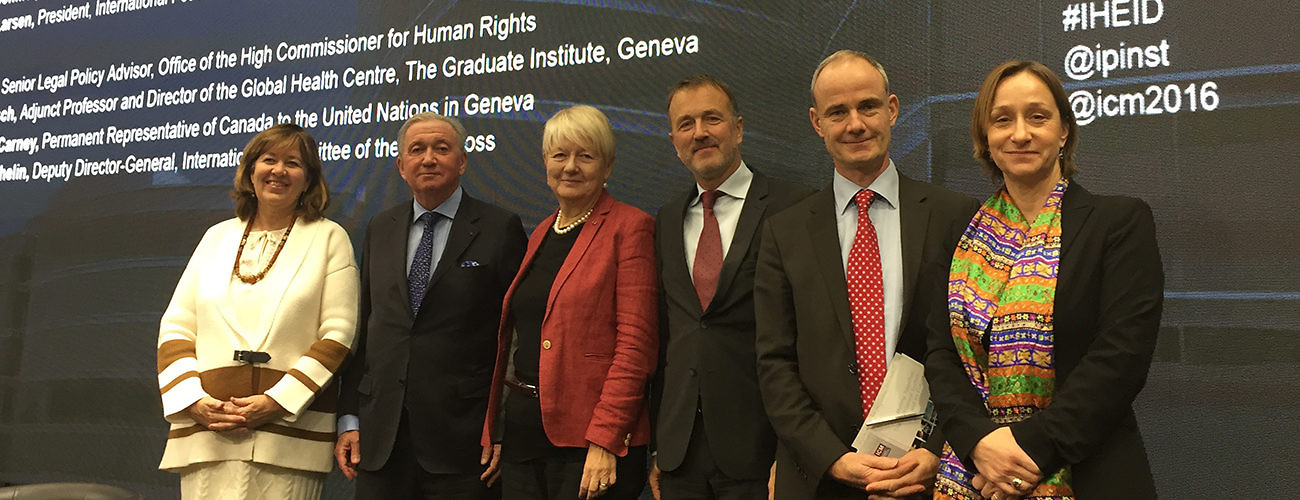“The UN still matters, but it needs to change,” declared IPI President Terje Rød-Larsen. “The main question is ‘How?’”
Mr. Rød-Larsen made his remarks at the launch of the Independent Commission on Multilateralism (ICM) final report at the Graduate Institute of International and Development Studies (IHEID) in Geneva on December 12, 2016.
The report, the product of a highly consultative process begun in September 2014, aimed at determining whether 70 years after its founding, and preparing for the arrival of a new secretary-general, the UN is still “fit for purpose.” The report posited ten general principles to guide a revitalized UN-based multilateral system and made concrete recommendations about how to address the specific challenges to the multilateral system across sixteen issue areas.
Among the recommendations of the report that Mr. Rød-Larsen referred to were a need to “bridge the silos,” and a recognition that sustaining peace involves all three founding pillars of the UN’s work—peace/security, development, and human rights. He added that “no commitment would be complete without a concerted effort to further empower women and engage with youth.”
Emphasizing another finding of the report, he said it was essential to “develop sustainable and predictable financing.” He said that he was not referring to “more funding,” but “better funding.”
Next to speak was Rosemary McCarney, Permanent Representative of Canada to the UN and the Conference on Disarmament in Geneva; Canada has served as a co-chair of the ICM together with Norway since 2014.
She also focused on multilateralism, saying it was “a necessity, not an idealistic ambition.”
“The ICM report pairs altruistic support with a healthy dose of self-interest,” she said. “Whatever the temptations for unilateral action, we know that multilateralism tends to be less expensive, much wiser, and much more sustainable.”
Acknowledging that “borders tend to be very thick,” she said, “I think multilateralism is really about thinning borders while respecting national sovereignty. Borders are part of our histories and how they’re written.”
She concluded, “Finding common ground is worth the effort. On our own we make progress, but together we can change destinies.”
Ilona Kickbusch, Director of the IHEID Global Health Centre, said that while health is a local issue, “health issues cross borders.” She called for “cooperation between responsible states and other actors.”
Professor Kickbusch is also a member of the Ebola Interim Assessment Panel—which studied all aspects of the World Health Organization (WHO)’s response in the Ebola outbreak—and now serves on the Secretary-General’s Task Force on Health Crises. She described health as “the key to development, it’s an outcome of development. It’s one of the most clear elements of development.”
Speaking of the need for implementation of international health regulations, she said, “We want to see clear, independent assessments of the progress of countries. We need a much more effective architecture for health, and that means committing to multilateralism.”
Balthasar Staehelin, Deputy Director-General of the International Committee of the Red Cross (ICRC), cited report recommendations like an investment in prevention to reduce violations of international humanitarian law (IHL) and greater inclusion of local actors. “People, namely in armed conflict, believe that IHL is absolutely vital,” he said.
He also talked about the ICRC’s Health Care in Danger project—which seeks to expose the frequency of healthcare facilities being attacked in conflict situations and champion greater respect for IHL provisions designed to ensure access to, and safe delivery of, healthcare. “We have a very clear indication that people think it’s wrong to attack medical facilities,” he said.
Cécile Aptel, UN High Commissioner for Human Rights’ senior legal policy adviser, noted that the UN, a norm-based organization, had played a key role in developing international law, but more must be done to enhance compliance. “The widespread violation of international humanitarian and refugee law are not only stains, they are also root causes of violent extremism, forced displacement, and under-development,” she said. “Norm-setting institutions such as the UN gain legitimacy when those who commit these crimes are held responsible.”
Ms. Aptel, also an associate professor at the Fletcher School of Law and Diplomacy, and a visiting associate professor at Harvard University, returned to the centrality of multilateralism. “What we see today is certainly not a risk for the multilateral system to be irrelevant,” she said. “In fact, we listed through and through the many challenges that can only be fixed by the multilateral system. The risk of irrelevance is in not delivering.”
Dr. Gilles Carbonnier, Director of Studies, and Professor of development economics at IHEID, made welcoming remarks.
IPI President Terje Rød-Larsen moderated the panel.
The event was co-organized with the Graduate Institute Geneva (IHEID).








